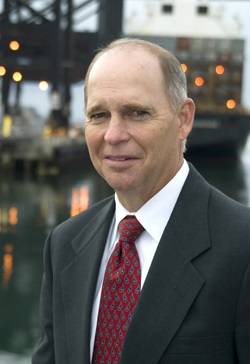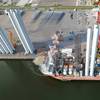AAPA Commends Senate Passage of WRDA Bill
The American Association of Port Authorities (AAPA) lauded Sens. Barbara Boxer (D-Calif.) and David Vitter (R-La.), chairman and ranking member, respectively, of the Senate Committee on Environment and Public Works, for their leadership in advancing S. 601, the Water Resources Development Act of 2013 (WRDA), through the Senate. The legislation was passed by a vote of 83-14.
“AAPA commends Senators Boxer and Vitter on their leadership in advancing this legislation to spur vitally needed maintenance and improvements in America’s seaport related infrastructure and waterways,” stated AAPA President and CEO Kurt Nagle.
“Senators Boxer and Vitter recognize the significant benefits more modern, efficient seaport and waterway infrastructure will have on our nation’s economic vitality, job growth and international competitiveness, as well as its value in helping address federal fiscal realities through sizable tax revenues provided by the cargo and trade activity moving through these systems,” Mr. Nagle said. “Increased investments are needed to better maintain and improve the transportation infrastructure on our three coasts and the Great Lakes, linking America to the global marketplace.”
He added, “America’s public ports and their private sector partners plan to invest over $46 billion in seaport infrastructure in the next five years. We need the federal government to uphold its end of the partnership, including badly needed improvements to the land- and water-side connections to seaports.”
Adolph Ojard, AAPA chairman of the United States delegation and executive director of the Duluth Seaway Port Authority, said WRDA is a timely opportunity to address key federal policy issues of major importance to U.S. seaports and the nation. “As the federal government looks to resolve its budget and deficit challenges, it’s imperative to focus scarce federal resources in those areas that can have the greatest impact,” said Chairman Ojard. “Investments in seaports are an essential, effective utilization of limited federal resources, paying dividends through both immediate and long-term sustainable job creation, economic growth, tax revenues, and enhanced international competitiveness.”
Seaports and the cargo activity they handle are vital components of the national economy. More than 99 percent of overseas trade moves through America’s seaports and more than a quarter of U.S. GDP is accounted for by international trade. Furthermore, cargo moving through America’s seaports is responsible for more than 13 million U.S. jobs and seaport activity generates in excess of $200 billion annually in federal, state and local tax revenues.
A recent study by the American Society of Civil Engineers (ASCE) found that under current budget trends, less than half of the needed investments in seaports and waterways would be made by the year 2020. In just seven years, this “failure to act” would cost the U.S economy almost $700 billion in lost GDP, $270 billion in lost U.S. exports, additional costs to each household of $770 a year, and 738,000 lost jobs.
To address one of the key components of the WRDA – collection and use of the federal Harbor Maintenance Tax (HMT) – AAPA’s U.S. Legislative Policy Council has adopted six guiding principles. The principles include guaranteeing full use of HMT annual revenues; ensuring that funding from HMT revenues first should be used for historical intended purposes; providing more equity for HMT donors; assuring that U.S. tax policy not disadvantage U.S. ports and maritime cargo; ensuring a process to efficiently study and construct deep draft navigation projects; and, modernizing the cost-share formula for dredging federal navigation channels.
“With the recent floor action on Senate Bill 601, AAPA and our members are in the process of reviewing the details of the legislation, as amended, and we will be able to more fully address the specifics provisions of the bill in the near future,” said Mr. Nagle. “We look forward to working with the House Transportation and Infrastructure Committee as it develops its WRDA legislation toward the goal of successful passage and enactment of legislation addressing the infrastructure needs of seaports throughout the United States.”
www.aapa-ports.org













